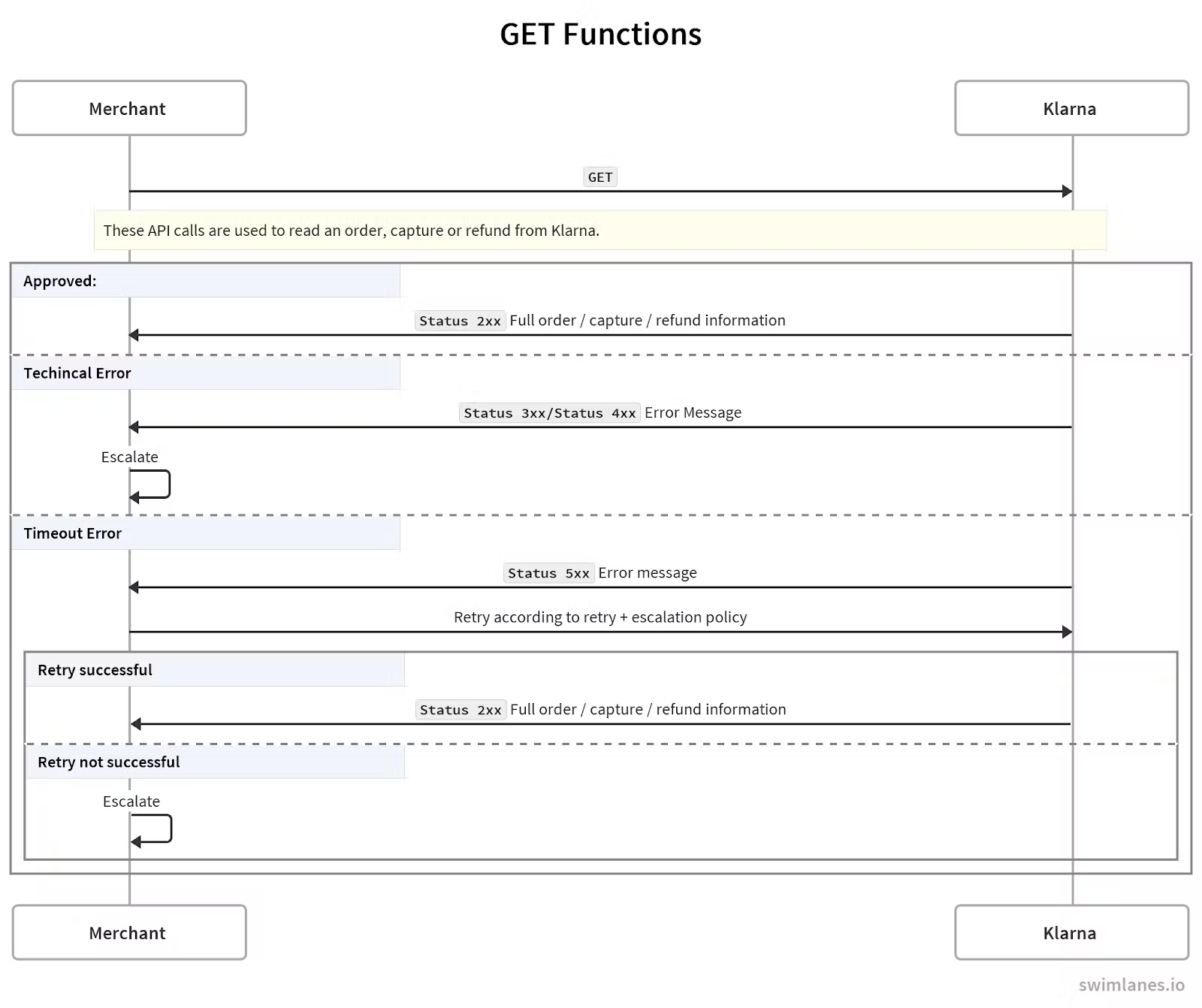⚠️ This applies only to Order Management API
In a distributed systems architecture, communication between single systems can always come across situations where one system does not answer immediately or with a certain error statement. The escalation and retry policy is a concept to implement all backend calls, following the actual purchase in the frontend, in a way that makes a system as robust and fail-safe as possible.
There are multiple reasons for a call to fail:
-
The initial connection fails
-
The call fails midway while the server is fulfilling the operation
-
The call succeeds, but the connection breaks before the server can reply
In all cases, the current state of the order is uncertain. In some cases a retry is safe (when no change to an order is made), in others, it is not, as the actual state of the order in Klarna is unknown to the merchant.
To prevent inconsistencies in a distributed system environment, Klarna recommends the use of idempotency keys for all POST / PATCH calls. This will ensure that a retry is safe as it will only be executed once per unique key (as long as it’s performed within 24 hours after the first attempt).
The idempotency key should be included in the header of the call, following the structure below:
{
"Klarna-Idempotency-Key": "c6010e41-5eb0-46a9-8cc0-decb265419b1"
}
It is advised to generate the key according to the specifications of the UUIDv5 standard.
Example:If two capture requests with different (or no) idempotency keys, with capture amount €10 are sent, then two captures will be registered and the total captured amount would be €20.However, if the two requests share the same idempotency key, the capture will be registered only once. Hence, the total captured amount would be €10. Note that both requests will generate the same response.
In case a call shall be retried as described in the below use case scenarios, the retry shall be done with the following waiting times:
-
1st retry: 5 seconds
-
2nd retry: 5 minutes
-
3rd retry: 5 hours
Once three retries are reached an escalation at the merchant's side should be triggered. These API calls are used to read an order, a capture or a refund from Klarna.
-
Get Order GET /ordermanagement/v1/orders/{order_id}
-
Get all captures for one order GET /ordermanagement/v1/orders/{order_id}/captures
-
Get one capture GET /ordermanagement/v1/orders/{order_id}
-
Get refund POST /ordermanagement/v1/orders/{order_id}/refunds
Escalation and retry logic:

By using idempotency keys in the initial request, the retry mechanism described previously in Section 1.1 can be used for all post POST/PATCH functions
If the merchant does not use idempotency keys in the initial request, it is not safe to retry an API call. Failing calls should be escalated immediately as described in the following Section 2.
In the case a call is not answered with a positive response or an explicit error code, an escalation as described in the below section, should be triggered. The escalation should in all cases come from a technical support team inside the merchant’s organisation. Based on the case, the escalation might include an option to fix the error at hand and afterwards eventually retry the call. In some cases, Klarna’s merchant support team might be needed to help resolve the issue.
These API calls are used to change and/or update information in the order:
-
Acknowledge an order POST /ordermanagement/v1/orders/{order_id}/acknowledge
-
Set new order amount / order lines PATCH /ordermanagement/v1/orders/{order_id}/authorization
-
Cancel Order POST /ordermanagement/v1/orders/{order_id}/cancel
-
Update Customer address PATCH /ordermanagement/v1/orders/{order_id}/customer-details
-
Update Merchant reference PATCH /ordermanagement/v1/orders/{order_id}/merchant-references
-
Release remaining authorization POST /ordermanagement/v1/orders/{order_id}/release-remaining-authorization
-
Extend authorisation time POST /ordermanagement/v1/orders/{order_id}/extend-authorization-time
-
Create capture POST /ordermanagement/v1/orders/{order_id}/captures
-
Add Shipping info POST /ordermanagement/v1/orders/{order_id}/captures/{capture_id}/shipping-info
-
Resend End Customer communication /ordermanagement/v1/orders/{order_id}/captures/{capture_id}/trigger-send-out
-
Create a refund POST /ordermanagement/v1/orders/{order_id}/refunds
In the case of an error message, no end customer communication is triggered by Klarna.
Should an API call go wrong, end customer communication needs to be handled by the merchant.
Escalation and retry logic:
